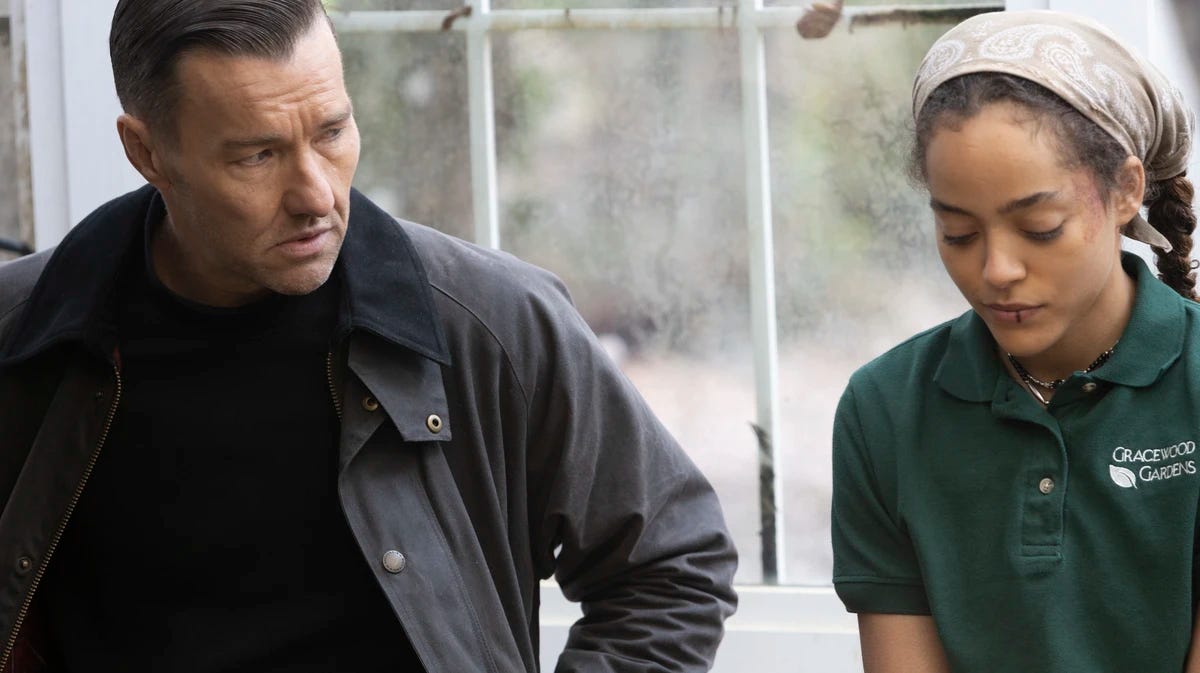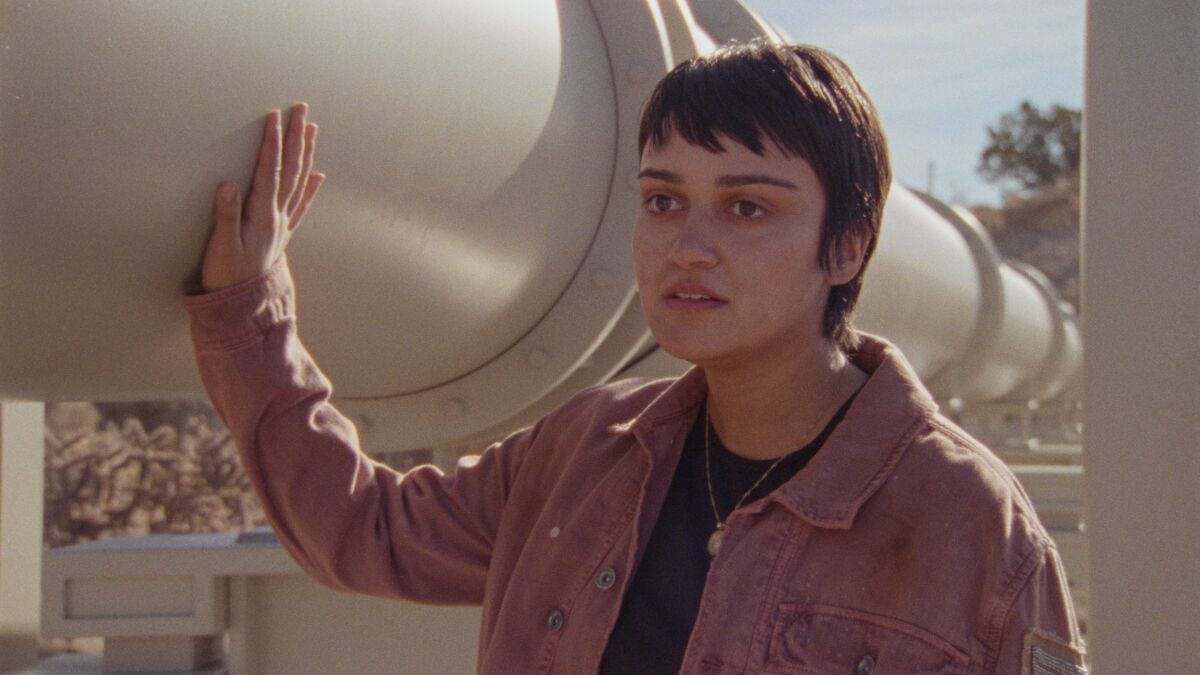What To Watch: Planter's Punch
Paul Schrader's "Master Gardener" in theaters, "How to Blow Up a Pipeline" and "Queenmaker" on demand.

At what point do an artist’s recurrent themes become shtick? When does repetition become fetish? I ask because “Master Gardener” (⭐ ⭐ 1/2, in theaters today) at times almost seems like a parody of a Paul Schrader film. At other times it bristles with the unholy strengths and moral paradoxes of this director’s best work. One way or the other, it’s a movie to be reckoned with.
Schrader has framed “Master Gardener” as the third in a loose trilogy of what he calls his “Man in a Room” films, following “First Reformed” (2017) and “The Card Counter” (2021). Like those two, the new movie centers on an eerily controlled hero carrying an almost unbearable weight of sin: Title character Narvel Roth (Joel Edgerton) manages the show gardens of a wealthy estate owner, Norma Haverhill (Sigourney Weaver), but early on we learn that he has a heinous past for which he is atoning in many ways, not least by losing himself in the order and profusion of plant life. As with so many Schrader men over the years – and they are all men, from Travis Bickle in Schrader’s screenplay for “Taxi Driver” to the drug dealer played by Willem Dafoe in “Light Sleeper” (1992) to Oscar Isaac’s obsessive-compulsive gambler in “The Card Counter” – the philosophy that keeps them tenuously sane pours out on the soundtrack in the form of inner monologues doubling as diary entries. “Gardening is a belief in the future, a belief that things will happen according to plan,” Narvel tells himself at one point. This being a Paul Schrader film, things will not go according to plan.
Norma, with whom Narvel has what can only be called an employee-with-benefits arrangement, urges him to take into his gardening crew a grand-niece, Maya (Quintessa Swindell), who is struggling with drugs and who is drawn to the quiet, precise master gardener like an iron filing to a magnet, recognizing the rage she senses burning beneath his surface. Like Ethan Hawke’s penitent pastor in “First Reformed” and Isaac’s torturer-turned-card-counter, Narvel carries a violence in him that can only be contained so long by the soothing certainties of horticulture, and “Master Gardener” works its way toward a confrontation with both outer villains and inner demons that has come to feel like the filmmaker’s own version of Golgotha. (What’s changed from Schrader’s earlier films is that he now believes salvation is possible in the form of love.) This has always been our most Catholic of directors in his balancing of sin and unexpected grace; having begun his career writing a book about Robert Bresson (among others), Schrader has become that great cinematic mystic’s truest, most self-conscious heir.

So why does “Master Gardener” so often stumble over its own loamy feet? The dialogue is more bald this time around, occasioning laughter in several wrong places. (When Narvel tells Maya, “Plants rejuvenate; that’s what they do,” you get the metaphor just fine without him adding, “Like us.”) Weaver’s character is a ragbag of conflicting character traits: a WASPy doyenne with a mouth like a sailor, a repressed prude with a kinky streak. The actress makes it work – makes you understand how monstrous Norma truly is – but just barely, and Norma’s habit of calling the gardener “Sweet Pea” clangs on the ear every time you hear it. (That said, one of her last lines in the movie is ”God damn it, Sweet Pea,” which I’m afraid I’ll be using around the house for appropriate occasions.)
The characters aren’t fleshed out enough and seem too driven by a screenwriter’s needs rather than inner character logic – this is especially true of Maya. And, finally, Joel Edgerton is a fine actor but may simply lack the innate charisma to let us see the devil that lives far down in Narvel’s guts, the way Oscar Isaac made the card counter so rivetingly strange and Ethan Hawke put a faithful man’s agonizing loss of faith right up there on the screen. The way a taxi driver could absorb the world’s pervasive evil until he became a loaded gun to shoot it back out. “Master Gardener” is a worthy film but a schematic one – a plan for a garden rather than the garden itself. It suggests that it’s time for Paul Schrader to come out of that room and bring his men with him.

I’m catching up with it a few weeks late, but “How to Blow Up a Pipeline” (⭐ ⭐ ⭐), a new film that arrived in theaters and on VOD in April, is a taut little provocation – an eco-terrorism thriller that’s structured like a heist movie and casts the bombers as the good guys. It takes the title of Andreas Malm’s 2021 book and literalizes it, replacing the author’s impassioned non-fiction plea for radical climate action with a handful of youthful characters coming together in the West Texas desert to detonate two barrels of ammonium nitrate under a major oil line. The last movie in this space, Kelly Reichardt’s “Night Moves” (2013), tripped over trying to cover all points in the ethical debate while retaining sympathy for its characters; “How to Blow Up a Pipeline,” by contrast, plows straight ahead, saving the debate for a cursory penultimate scene and earlier summing up the vibe of bleak self-awareness when one character says “Do I feel like a terrorist? Of course I feel like a terrorist.” Flashbacks fill in “reasons” for everyone: Theo (Sasha Lane) has terminal cancer from growing up near a refinery, Xochitl (Ariela Barer) lost her mother to a heatwave, Dwayne (Jake Weary) is a good old boy who lost his land to eminent domain, Michael (Forrest Goodluck) is an indigenous kid who’s seen the oil companies carve up his people’s home. And so forth.
Does the movie need the reasons? I’d argue they’re beside the point – a sop to audiences that “Pipeline” otherwise just ignores. What’s most interesting and impressive is how young this all feels – how much a product of not just a fresh generation of activists but of filmmakers. Director Daniel Goldhaber, 31, made his name with 2018’s “Cam” (⭐ ⭐ ⭐), a psychological horror drama built around the world of “camming” that in its understanding and acceptance of the new rules of online reality couldn’t have been conceptualized by anyone even a decade older. The stars are in their 20s and largely unknown. (Lane starred in “American Honey,” Marcus Scribner was on TV’s “Black-ish.”) The attitude is reconstituted Monkeywrench Gang but with less time before the clock runs out than Edward Abbey ever imagined. Goldhaber and his cast repurpose the beats of the “Oceans 11” genre the way you’d build an eco-friendly home out of used car parts: There are tense moments while a bomb is assembled and one of the characters may or may not be a fink for the Feds, but the underlying assumption that This Is A Good Thing is never seriously questioned. That will anger a lot of people, and it’s easy enough to imagine a far-right filmmaker using the same structure to fashion an apologia for bloodier actions than anything we see here. Still, “How to Blow Up a Pipeline” sucks you in through the scruffy efficiency of its filmmaking and it doesn’t care whether you argue with it or not. In a landscape of craven corporate media, that may be the most revolutionary act of all. Will this movie spawn copycat actions? I doubt it. But it may be more influential to a coming generation of storytellers than the old guard may expect.
Thanks to my friend and critical colleague Glenn Kenny for tipping me to the existence of “Queenmaker: The Making of an It Girl,” a new documentary on Hulu that has me honestly stumped for a star rating. In Glenn’s New York Times review today, he calls the film a “doozy,” and, brother, he ain’t kidding. It’s effectively two movies, and the first one is a slog: A history of the Manhattan socialite scene at the start of the millennium that may be of interest only if you truly care about people like Paris Hilton and Tinsley Mortimer. (I don’t.) With the arrival of high-society gossip bloggers like Gawker and Perez Hilton, however, the tone turns darker, and eventually director Zackary Drucker zeroes in on the unlikely person behind the website Park Avenue Peerage, whereupon “Queenmaker” takes a turn for the genuinely strange: There’s a reveal about 40 minutes in that had me literally gasping. What has been a glitzy documentary about glitz becomes something far more resonant, profoundly sad, and, in the end, weirdly uplifting. Drucker taps into aspects of our culture’s pathological obsession with celebrity that have rarely been laid out so clearly: The worship that hides envy that hides self-loathing, the reliance on delusional narratives, the gulf between image and reality, the need to turn image into reality. I once wrote a book about fame that included the line “Behind every adoring fan letter is the urge to murder and replace,” which at least one friend took as tasteless hyperbole. A movie like “Queenmaker” makes me not so sure about that, although if there’s a murder here, it’s more a kind of suicide, and the replacing occurs in ways that were once unimaginable. But I’ve said too much already. The film’s out there on Hulu if you’re willing to take a chance on a story that leaves both the people in it and the people watching it in vastly different places than where they started.
Classic of the Week: “Without Love” (1945, ⭐ ⭐ ⭐) , on Turner Classic Movies Sunday at 6:00 A.M. — set your DVR (or just stream it on HBO Max). Perhaps the least known of Spencer Tracy and Katharine Hepburn’s nine onscreen pairings, it’s also one of the most pleasurable – a smart, eccentric comedy for grown-ups that casts Tracy against type as a caustic scientist who bunks with Hepburn’s rich widow in wartime Washington, D.C. Lovely moments abound: Tracy playing midnight piano as Hepburn listens on the landing, Hepburn quietly telling of her husband’s death, an enchanted Tracy asking her, “How do you breathe up in that little private world you live in?” The Tracy-Hepburn canon runs the gamut from great (“Adam’s Rib,” “Woman Of The Year,” “Pat and Mike”) to ghastly (“Keeper Of The Flame,” “The Sea Of Grass”), but this is at the better end of the spectrum.
I hope this gives you something to liven up your weekend. Don’t hesitate to weigh in with thoughts.
If you enjoyed this edition of Ty Burr’s Watch List, feel free to pass it along to others.
If you’re not a paying subscriber and would like to sign up for additional postings and to join the discussions — or just help underwrite this enterprise, for which the management would be very grateful — here’s how.





